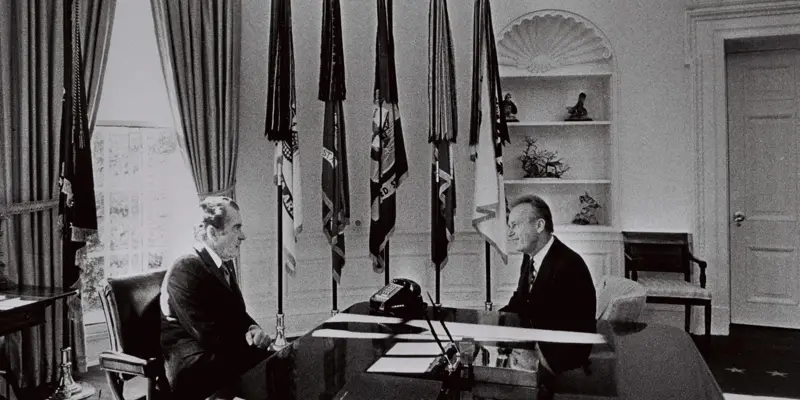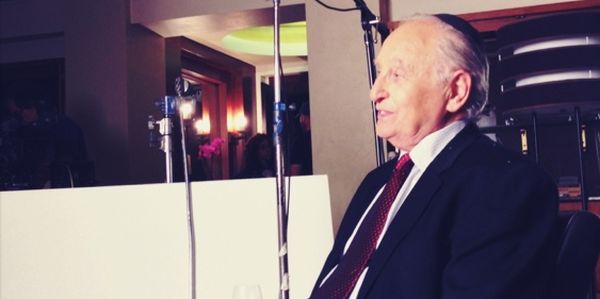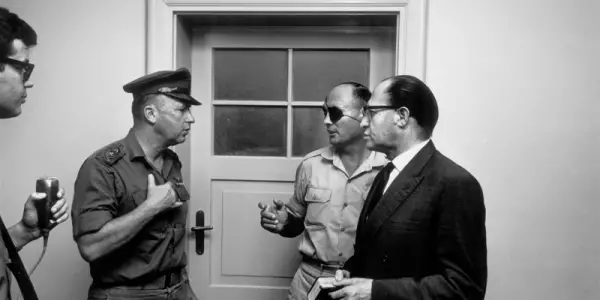THE PRIME MINISTERS: SOLDIERS & PEACEMAKERS: History Written By The Winners

Arlin is an all-around film person in Oakland, CA. He…
The Israel-Palestine conflict has been an enduring presence in our lives for generations now. Many know little about it, other than that it’s a perpetual and unfortunate situation with little hope for sustained resolution. They are unlikely to add significantly to that knowledge through a viewing of The Prime Ministers Part II: Soldiers and Peacemakers. The second in a two-part retrospective on the Prime Ministers of Israel throughout history, the film focuses on the regimes of Yitzhak Rabin and Menachem Begin, which spanned the 70s through the 90s.
Directed by Richard Trank, Soldiers and Peacemakers takes as its guide Yehuda Avner, an Israeli diplomat and adviser to the two Prime Ministers, and author of the book upon which the series is based. In an approach that seems to have gotten its inspiration from Errol Morris‘s long form interviews with Robert McNamara and Donald Rumsfeld, the film uses Avner’s recollections to trace the history of Israeli history and foreign policy. But while the film has all the technical markings of a solid historical doc, it contains none of the vision; one talking head, archival footage and the Ken Burns effect do not a successful documentary make.
Where’s the context?
The biggest weakness of Soldiers and Peacemakers is that it seems like a film made to preach to the choir; FIBI, For Israelis By Israelis. There is a shorthand at play, referencing specific wars, people and events, and without having seen the first film or having a better understanding of the story of Israel, one can be left to feel as though they are lost in an ocean of Israeli history with the waves washing over them. I know this is the second film (the first one being The Prime Ministers: The Pioneers), and undoubtedly some more context was provided in the first installment, but I can only judge this film on its own merits, and in this case context is sorely lacking. The result is a movie that can not stand on its own without extra-textual assistance.

Soldiers and Peacemakers offers only a surface level interpretation of the national leaders, looking at major historical pinpoints on a macro-level, without much context as to their cause and only a moderate attempt to humanize the players involved, and certainly without nuance. This is History with a capital “H”, unlikely to differ much from what might be found in an Israeli textbook. For instance, one event recounted is the hijacking of an Israeli passenger flight which was then diverted to Uganda, but little is offered as to the reasons leading up to such an act; rather, it is merely the set-piece against which Israel can act and emerge victorious.
With Avner as the film’s guide, Soldiers and Peacemakers operates entirely from the Israeli perspective. I don’t think that it’s necessary to be a scholar of Middle-East affairs to recognize that the Israeli position is at the very least problematic, and to let it go the better part of two hours completely unchallenged is dishonest and a disservice to the film’s aspirations of being a documentary. Documentaries by their very nature seek to investigate the truth and often some of the best ones have little idea of what their final film will look like when they set out shooting.

By hardly acknowledging, let alone actually considering, a differing perspective, the film relegates itself not quite to the category of outright propaganda, but more so glad-handing; the film pats itself and its subjects on the back for a job well done, when such congratulations seem warranted by neither.
Conclusion
Prime Ministers: Soldiers and Peacemakers is not entirely bereft of entertaining moments; one memorable scene finds Yehuda recounting an amusing anecdote of a time he was served a kosher meal at Ford’s White House. But the cumulative effect of the film’s straight-forward and blunt narration of linear history is a film only slightly less dry than matzoh.
Soldiers and Peacemakers concludes with a soaring retrospective of both parts, commending all the various Prime Ministers for their actions and individual achievements, and proclaiming that we could not have the modern state of Israel as we know it without them, which is undoubtedly true. Yehuda states that the Prime Ministers underwent an extraordinary amount of “self sacrifice…simply in order to allow our people to live normal lives”. It is difficult not to read the “our” in that statement as meaning “not all”. By presenting only one perspective on a topic widely known to have at the very least two, most of the value of this film comes not as a quality documentary, but rather as an informative case study on history written by the winners.
Can you recommend a more nuanced documentary on Israel’s history?
(top image source: Shotwell Media)
Does content like this matter to you?
Become a Member and support film journalism. Unlock access to all of Film Inquiry`s great articles. Join a community of like-minded readers who are passionate about cinema - get access to our private members Network, give back to independent filmmakers, and more.
Arlin is an all-around film person in Oakland, CA. He received his BA in Film Studies in 2010, is a documentary distributor and filmmaker, and runs Drunken Film Fest Oakland. He rarely dreams, but the most frequent ones are the ones where it's finals and he hasn't been to class all semester. He hopes one day that the world recognizes the many values of the siesta system.












